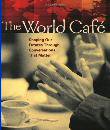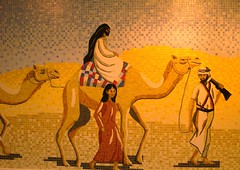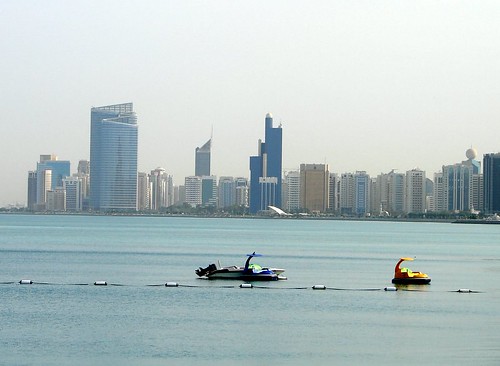Wednesday, November 16, 2005
Learning in the Real World
By Jay Cross, CEO, Internet Time Group and
Chair, International Steering Committee of Emerging Elearning 2005
“Education is the key to a country's social, technological, political and economic development. It shapes young minds and inspires the entrepreneurial spirit in society. As such, the students of today are the future leaders and we must ensure that they get every possibility of success from our education and training systems.” Dr. Tayeb A. Kamali, Vice Chancellor of HCTIt is easy to confuse learning with school. All too often, we forget that most learning takes place in life, not in the classroom. People learn from doing, and improved performance is the measure of their success.
Focusing too closely on schools leads us to absurdities like America’s “No Child Left Behind” program, which equates learning with passing a test. I hope the UAE adopts more pragmatic goals, for example “Make the Emirates the Silicon Valley of the Middle East.”
Elearning
Seven years ago I made up the term “elearning.” I wanted people to consider the benefit of adding the power of the internet to traditional learning. (Only five years ago, many people thought the internet would never amount to anything!) Some people immediately misinterpreted my concept, thinking I meant training by computer alone. This is nonsense. Elearning provides great support of workshops, discovery, books, mentors, guided practice, and other traditional forms of learning. Relying on the computer alone for education is like building a house using only a hammer as a tool.
At Emerging Elearning, our distinguished speakers will be sharing ideas on what makes for successful education, technological or not. The concept of elearning should expand opportunities, not limit them. We plan to use all the tools available.
Emerging
Emergence is the key characteristic of complex systems. It is the process by which simple entities self-organize to form something more complex. The UAE was in the forefront in naming its conference Emerging Elearning three years ago. Simple, old elearning has combined with bottom-up self-organizing systems, network effects, and today’s environment to morph into emergent learning.
Emergent learning implies adaptation to the environment, timeliness, flexibility and space for co-creation. Emergence refocuses our thinking on the future. Emergent learning encourages experiment and innovation; elearning fosters incrementalism and complacency.
Emergent learning enables us to push beyond the confines of elearning to explore combinations with informal learning, storytelling, social network analysis, appreciative inquiry, workflow learning, conversation, contextual collaboration, organic KM, simulation, dynamic portals, expert location and blogs.
I am in the midst of writing a book on Informal Learning for Pfeifer press. I am finding Abu Dhabi a tranquil and inspiring place to write. I cannot help but bring models of informal learning to this conference, for example, our world café.
Emerging Elearning World Café
The World Café is not Starbucks. It is a process for fostering conversations that matter. Instead of one-way presentations, a World Café event encourages people to work together. At Emerging Elearning, we aim to draw out the best thinking of both UAE officials and the thought leaders from outside the UAE
We begin with questions.
K-12 Educational Revolution. How does a country design and implement a world-class, standards-based K-12 educational system? What advice can we offer, especially around issues of technology? What new technologies might enable the UAE to leapfrog current systems? Where do we start?Normally, people spend most of their time at work or at home. Work is a demanding, pressure-packed, rats-in-the-maze race with the clock to get the job done. Home is a comfortable, private space for sharing time with family and individual interests. Neither work nor home, a World Café is a neutral spot where people come together to offer hospitality, enjoy comradeship, welcome diverse perspectives, and have meaningful conversations.
 Emirati know this process well. One has only to look at the back of a dirham to see the prominence of the coffee pot in local culture. The tradition of hospitality with coffee dates back to the mists of time. Coffee conversations in the desert have played a significant role in bringing people together for centuries. It is in this spirit that we are convening a World Café in the library of the HCT.
Emirati know this process well. One has only to look at the back of a dirham to see the prominence of the coffee pot in local culture. The tradition of hospitality with coffee dates back to the mists of time. Coffee conversations in the desert have played a significant role in bringing people together for centuries. It is in this spirit that we are convening a World Café in the library of the HCT.You may wonder if this California concept will work for our purposes in the UAE. The World Café technique is best suited for sharing knowledge and stimulating innovative thinking around real-life issues and questions; the UAE situation fills that bill. The Café is good for conducting an in-depth exploration of key challenges and opportunities; yes, that’s what we want to do. The Café engages people meeting for the first time in authentic conversation; we have not only people meeting for the first time, but they are also Emirati, Italians, Americans, Saudis, Austrians, Brits, Chinese, and Norwegians, among them government officials, professors, vendors, consultants, and school teachers. We have diversity.
We often fail to see the riches in our own back yards. Imagine that conversation is the core process for accessing collective intelligence and co-evolving the future. You would be in good company:
• Gary Hamel writes that “Strategizing depends on creating a rich and complex web of conversations that cuts across previously isolated knowledge interests and creates new and unexpected combinations of insight.”
• Alan Webber writes in HBR that “Conversations are the way workers discover what they know, share it with their colleagues, and in the process create new knowledge for the organization. In the new economy, conversations are the most important form of work…so much so that the conversation is the organization.”
• David Bohm suggested that “there is the possibility for a transformation of the nature of consciousness, both individually and collectively, and that whether this can be solved culturally and socially depends on dialogue.”
• David Cooperrider writes that, “Talk is key to the executive’s work…the use of language to shape new possibilities, reframe old perspectives, and excite new commitments…the active process of dialogue.”
• Tom Atlee says, “Dialogue is the central aspect of co-intelligence.”
• The Dalai Lama has said, “The reality today is that we are all interdependent and have to coexist on this small planet. Therefore, the only sensible and intelligent way of resolving differences and clashes of interests, whether between individuals or nations, is through dialogue.”
 These quotations come from a wonderful new book entitled The World Café. In it, Juanita Brown writes, “The World Café reintroduces us to a world we have forgotten. This is a world where people naturally congregate because we want to be together. A world where we enjoy the age-old process of good conversation, where we’re not afraid to talk about things that matter most to us. A world where we’re not separated, classified, or stereotyped. A world of simply greeting, free from technology and artificiality. A world that constantly surprises us with the wisdom that exists not in any one of us but in all of us. And a world where we learn that the wisdom we need to solve our problems is available when we talk together.”
These quotations come from a wonderful new book entitled The World Café. In it, Juanita Brown writes, “The World Café reintroduces us to a world we have forgotten. This is a world where people naturally congregate because we want to be together. A world where we enjoy the age-old process of good conversation, where we’re not afraid to talk about things that matter most to us. A world where we’re not separated, classified, or stereotyped. A world of simply greeting, free from technology and artificiality. A world that constantly surprises us with the wisdom that exists not in any one of us but in all of us. And a world where we learn that the wisdom we need to solve our problems is available when we talk together.”I’m looking forward to engaging in some conversations that matter. Our collective intelligence is greater than our individual intelligence. We have the opportunity to do good work together and enjoy ourselves at the same time. How about a cup of coffee?











0 Comments:
Post a Comment
<< Home